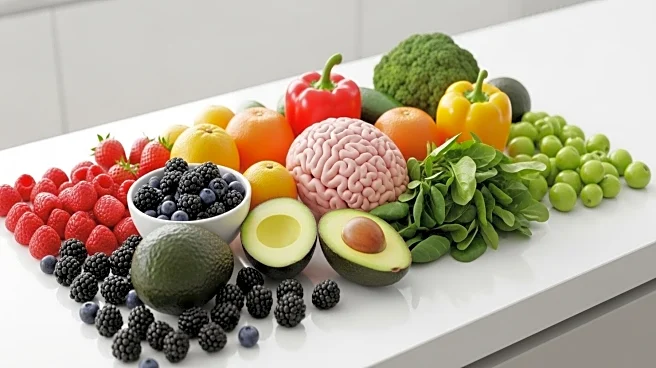What's Happening?
The global market for brain health functional foods and beverages is experiencing significant growth, driven by increasing consumer demand for products that support cognitive health. According to Grand View Research, the market is currently valued at $18.1 billion and is projected to reach $40.3 billion by 2030, with a compound annual growth rate (CAGR) of 10.5%. This growth outpaces the broader wellness industry, which is also expanding but at a slower rate. Key categories within this market include foods rich in creatine, omega-3 fatty acids, and antioxidants, such as red meats, oily fish, leafy greens, nuts, seeds, and berries. These foods are recognized for their potential to enhance brain function, improve memory, and protect against cognitive decline.
Why It's Important?
The expansion of the brain health functional foods market reflects a broader trend towards health-conscious consumer behavior, where individuals are increasingly seeking products that offer both nutritional and cognitive benefits. This shift presents significant opportunities for food and beverage manufacturers to innovate and cater to a growing segment of health-focused consumers. As cognitive health becomes a mainstream concern, companies that can effectively market and deliver functional foods with proven brain health benefits stand to gain a competitive edge. This trend also highlights the potential for improved public health outcomes, as better nutrition can contribute to enhanced mental performance and resilience against age-related cognitive decline.
What's Next?
As the market for brain health functional foods continues to grow, manufacturers are likely to invest in research and development to create new products that meet consumer demand for effective and convenient cognitive health solutions. Additionally, there may be increased collaboration between food companies and health professionals to validate the health claims of these products. Regulatory bodies might also play a role in ensuring that marketing claims are substantiated by scientific evidence. The industry could see further segmentation as companies target specific demographics, such as aging populations or individuals with high cognitive demands, with tailored products.
Beyond the Headlines
The rise of functional foods for brain health also raises questions about the ethical implications of marketing health benefits and the need for transparency in labeling. As consumers become more informed, they may demand greater accountability from manufacturers regarding the efficacy and sourcing of ingredients. Furthermore, the trend underscores the importance of addressing broader dietary patterns and lifestyle factors that contribute to cognitive health, beyond the consumption of specific functional foods.









